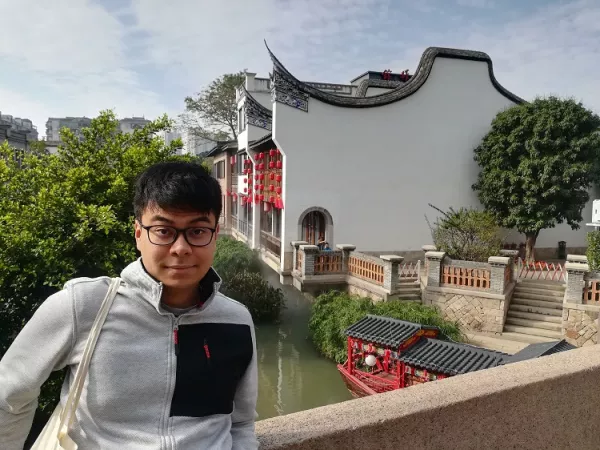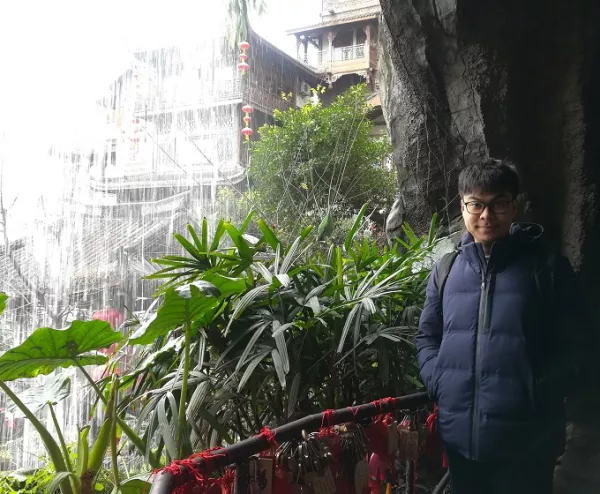Investigator Spotlight: Getting to Know Tom Chen

Welcome to our spotlight series, where we look beyond the CV and learn more about our investigators. Tom Chen, PhD, is an Instructor who joined our department as a fellow in 2018 and transitioned to a faculty position in 2019. His research areas encompass topics in missing data, correlated data, and statistical computing. Join us as we learn more about Dr. Chen.

Fuzhou, China.
Q: Where are you from?
A: Poughkeepsie, NY. Known famously as the midpoint between Albany, NY and New York, NY and the location of Vassar College, and perhaps nothing else.
Q: What's your educational background?
A: I received my BS in Economics and Biostatistics from Cornell University (formally, the degrees were in Applied Economics & Management and Biometry & Statistics, and I often joke that I quadruple majored). I later received my PhD in Biostatistics at Harvard University.
Q: What sort of work did you do before coming to HPHCI?
A: After receiving my BS but before pursuing my PhD, I worked a year at Aon Hewitt as an analyst. After receiving my PhD, I worked as a post-doc at the Institute before becoming an instructor here.
Q: Explain what you do.
A: I'm a biostatistician focused on discovering methods to analyze data mired with complex correlations, missing data, or numerical fitting issues. Most of my days involve a lot of scratch paper and writing code in R. I also love to form collaborations with other researchers at the Institute on their projects, for which I offer statistical support.
Q: Interesting work! Tell us about one of your current projects.
A: I'm currently writing a paper and a corresponding R package to analyze multilevel and stepped wedge cluster randomized trial data and estimate the various correlations induced from such designs. This package will also include options for stochastic approximation fitting for faster computation and fewer numerical errors for large-scale data.
A bit of background as to why this problem is important: investigators are often interested in estimating the treatment effect of some intervention, while other considerations such as the clustered or longitudinal nature of the data are viewed as nuisances that must be accounted for. However, the correlations induced from these designs are vital for sample size calculations and therefore estimating these correlations, especially in a statistically robust way for complicated trial designs, is vital. As a result of the complicated nature of these designs, fitting statistical models may sometimes fail or take an excessive amount of time to return a result, so on top of statistically robust, I am interested in computationally efficient ways to estimate these parameters.
Q: What excites you most about being at the Institute?
A: While my main research interests are focused on methodology, I love the wide range and availability of collaborators and projects here at the Institute. Besides switching up the flavor of my work, it's fun to talk to people from various backgrounds. For the longest time, I never focused much on the "bio" portion of my title as "biostatistician", so it's refreshing to gain subject-matter knowledge through collaborations with medical doctors and epidemiologists.
Q: What book/television show/or podcast do you love right now, and why?
A: All my answers can only be labeled as lame because the books I love reading most are math books. The Division of Biostatistics has a biweekly (every two weeks) book club, where we read through Semiparametric Theory and Missing Data by Tsiatis, which contains knowledge relevant to my work at the Institute. One book that has absolutely no relevance to my research at the Institute that I can say I'm genuinely reading for pleasure is Geometry: A Comprehensive Course by Pedoe, which is a graduate-level introduction to geometry. I don't watch as many TV shows, but love watching horror and sci-fi movies.

Q: When you’re not analyzing data, what do you enjoy doing in your free time?
A: Maybe I'll start listing hobbies that are most-relatable to least-relatable. I enjoy board and "quest" games of various types; this includes Escape Room-type activities. I also volunteer at PieRSquared, which is an after-school math tutoring program for Boston area middle school and high school students located near Dudley Station. I also love playing tennis when I get the chance. I find it soothing to browse through supermarkets or department stores (does this count as a hobby?). I also frequent StackExchange to learn things in math I didn't know about before or help answer questions from others on the site.
Q: What drew you to – and has kept you in - the Boston area?
A: For the longest time, I've always enjoyed staying somewhat close to my hometown. NYC has always seemed like the natural choice, hosting many job opportunities while being just a little over an hour away from my Poughkeepsie. So, it was a surprise when I found out my first job out of college at Aon Hewitt was located in Waltham, and since then I've learned to live in (and love) the Boston area. I actually do like the appeal of a bustling metropolis, but just the general "academic" feeling of the Boston area is a powerful persuasion to keep me here.